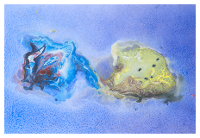Speaker
Andreas SCHMITT
(Vienna University of Technology)
Description
Due to magnetic catalysis, a strong magnetic field enhances the chiral condensate and thus can also be expected to increase the vacuum mass of nucleons. I will discuss resulting effect on the transition between vacuum and nuclear matter at zero temperature within two relativistic field-theoretical models. The results show that the creation of nuclear matter in a sufficiently strong magnetic field becomes energetically more costly due to the heaviness of magnetized nucleons, even though it is also found that nuclear matter is more strongly bound in a magnetic field. These results are potentially important for dense nuclear matter in compact stars, especially since previous studies in the astrophysical context have always ignored the contribution of the magnetized Dirac sea and thus the effect of magnetic catalysis.
Author
Andreas SCHMITT
(Vienna University of Technology)
